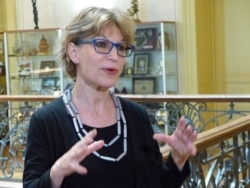There is "credible evidence" linking Saudi Crown Prince Mohammed bin Salman to the killing of dissident journalist Jamal Khashoggi last October in Riyadh's consulate in Istanbul, a U.N. rights investigator said Wednesday.
Agnes Callamard, the U.N. special rapporteur on extrajudicial executions, said in a new 101-page report after a six-month investigation that Khashoggi was "the victim of a deliberate, premeditated execution, an extrajudicial killing for which the state of Saudi Arabia is responsible under international human rights law."
She said sanctions should be imposed on the prince's personal foreign assets "until and unless evidence is provided and corroborated that he carries no responsibilities for this execution."
Callamard called for U.N. Secretary-General Antonio Guterres to open a formal criminal investigation into the death of Khashoggi, 59, who was living in self-imposed exile in the United States.
'Baseless'
A Saudi minister rejected the report as "baseless" and questioned Callamard's neutrality.
"The report of the rapporteur in the human rights council contains clear contradictions and baseless allegations which challenge its credibility," Saudi Minister of State for Foreign Affairs Adel al-Jubeir said Wednesday on Twitter.
Khashoggi wrote newspaper columns critical of the crown prince, the country's de facto ruler, that were published in The Washington Post.
Callamard, who carried out her investigation as part of her mandate as a special rapporteur, said "no conclusion is made" as to the crown prince's guilt in the assassination and dismemberment of Khashoggi's body with a chain saw. The body has never been found.
But Callamard said she concluded "that there is credible evidence, warranting further investigation of high-level Saudi officials' individual liability, including the crown prince's."
In the months since Khashoggi’s death, Saudi officials have exonerated the prince while the assassination has exonerated the crown prince, blaming rogue Saudi agents.
Callamard's report named 15 people she said were part of the mission to kill Khashoggi, who had gone to the Saudi Consulate in Istanbul to retrieve documents for his upcoming marriage as his fiancee waited outside for his return. But Callamard said some of the 15 were not among the 11 unnamed suspects facing a closed-door trial in Saudi Arabia for their alleged involvement in Khashoggi's death, five of whom face the death penalty if convicted.
Turkish Foreign Minister Mevlut Cavusoglu said his country "strongly" endorsed Callamard's report "holding those responsible accountable."
Callamard, however, said she found that both Turkey and Saudi Arabia had "failed to meet international standards regarding the investigation into unlawful deaths." Callamard said she discovered the crime scenes inside the consulate were "thoroughly, even forensically, cleaned."
That indicates, she said, "that the Saudi investigation was not conducted in good faith, and that it may amount to obstructing justice."
The U.S. Central Intelligence Agency and some Western countries say they believed that Crown Prince Mohammed ordered the killing, but U.S. President Donald Trump has questioned the conclusion of his own intelligence community and has been eager to preserve close security ties with the Saudi regime.







